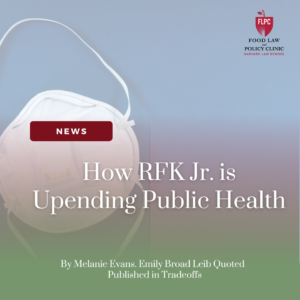by Katherine L. Record, JD, MPH, MA
Last week the Supreme Court attracted lots of attention when it heard arguments about whether a corporation can exclude mandatory preventive benefits from its employee health plan, based on a religious objection to certain types of healthcare. This is a tale as old as time; religion has long been the basis for opposition to reproductive (i.e., women’s) health – including the preventive healthcare now in question, contraception.
Yet this argument has nothing to do with government infringement on the practice of religion.
In fact, the corporation, Hobby Lobby, covered two of the four contraceptive devices in dispute until its lawyers were actually arguing the issue in court, apparently to little detriment to the company’s faith in God. What’s more, Hobby Lobby’s 401(k) includes more than $73 million invested in the companies that produce these objectionable contraceptives (e.g., intrauterine devices, emergency contraception).
This has not stopped Hobby Lobby from arguing that the Affordable Care Act (ACA) is threatening its freedom, as a corporation, to practice religion.
This is a clever argument. We take religious freedom seriously, as we should. Masking coverage of FDA-approved contraceptives, as the ACA requires, as an infringment on faith is catchy. Nonetheless, it is nothing more than smoke and mirrors, which we, as attorneys, have a knack for creating.
Practicing law is often a matter of distilling a problem into sterile elements and stringing them together to form a line of reasoning that favors a given conclusion. Generally, this allows judges to apply the law with an even hand, no matter how complicated life gets.
Yet it also allows us to paint an issue as something it is not. This is particularly problematic when the issue is inequality, a concept lawyers have masqueraded for years (justifying slaves as property, segregation, limited voting rights, a narrow definition of marriage).
Last week we did it again. Here’s the picture Hobby Lobby painted:
The ACA’s requirement that most health plans cover preventive services, including all FDA-approved contraception, violates the Religious Freedom Restoration Act of 1993 (RFRA). RFRA is a federal law that bars Congress from enacting a law that substantially burdens religious practice, even if it generally applies to all faiths, which passes muster under the First Amendment. In other words, RFRA creates more robust protection of religious freedom than the First Amendment.
Let’s break it down:
(1) RFRA protects the corporation’s right to practice religion just as it does a person’s right to practice (i.e., a corporation is a person, which is the case under the First Amendment, but has never been treated as such under this federal law);
(2) covering certain types of contraception substantially burdens this corporation’s religious practice; and
(3) the government does not have a compelling interest that justifies this insufficiently narrowly tailored intrusion into the company’s faith.
Sounds good, right?
It did to the Court. Last week, the attorney representing the United States and the Justices of the Court focused on this argument just as Hobby Lobby painted it, waxing poetic on statutory interpretation, principles of corporation law, the distinction between for-profit and non-profit tax status, and the intention of Congress as it existed in 1993 – when it enacted RFRA to protect a “person’s” right to religious practice.
All of this is irrelevant.
The legal profession is being dishonest by cloaking the real issue in legal doctrine. Hobby Lobby paints contraceptives as the Scarlett letter of the ACA, alleging that coverage of some types disrupts their Christian faith. Yet the ACA requires coverage of all FDA-approved contraception to protect women’s health – not to promote sex that does not produce offspring. In fact, 98% of sexually active Catholic women use contraception, yet the Catholic Church marches on.
As it turns out, healthcare is healthcare, even if you have a uterus.
Women who do not space out pregnancies are at higher risk for adverse outcomes – both for the mother and the child. Women who get pregnant accidently – whether unintentionally or unwillingly, are more likely to give birth prematurely, to develop depression, to avoid prenatal care.
Moreover, some women require contraception for reasons entirely unrelated to conception (e.g., amenorrhea or menstrual irregularities, fibroids, endometriosis). And not all women can take the kind of contraception Hobby Lobby deems pious (e.g., an intrauterine device can be medically necessary if a woman cannot take the pill).
In short, women and children are healthier when medically indicated contraception is available – which is why contraception is a healthcare benefit. Requiring companies to offer the same level of healthcare to both female and male employees does not impede religious autonomy, it keeps the workforce healthy.
In June, the Supreme Court will issue a ruling couched in terms of religious autonomy. Yet it will not affect religious practice, Hobby Lobby’s or otherwise. Rather, the Court will determine whether an employer can charge women more than men for preventive services (i.e., provide comprehensive coverage for men and partial coverage for women). In other words, the Court is once again considering equality, masqueraded as a religious threat.
Are women sufficiently person-like to access the same degree of medical coverage as men? The Court very well might say no.
Fortunately, the law is not a foregone conclusion. Indeed, over time, the Court has reversed itself on matters once considered predetermined by our forefathers (e.g., the federal ban on gay marriage, criminalization of sodomy, and the status of black persons as, well, persons). Women might not be equal to men quite yet, but there is hope.
*This blog post originally appeared on Harvard Law School’s Petrie-Flom Center Bill of Health and Our Bodies Ourselves.
————–
The views reflected in this blog are those of the individual authors and do not necessarily represent those of the Center for Health Law & Policy Innovation or Harvard Law School. This blog is solely informational in nature, and not intended as a substitute for competent legal advice from a licensed and retained attorney in your state or country.


Health Law & Policy, Commentary
Federal Government Cuts Health Grants and Grantees File Litigation in Response
April 21, 2025